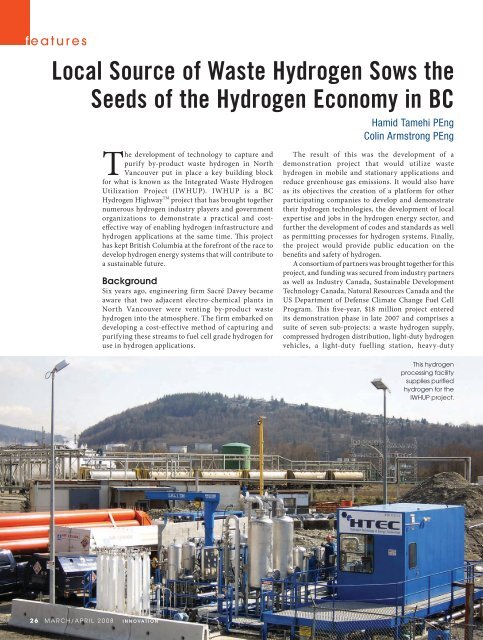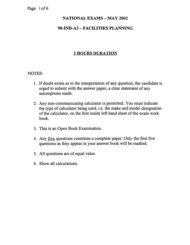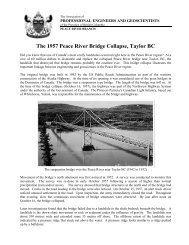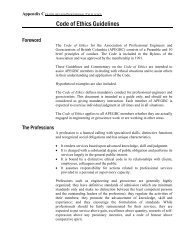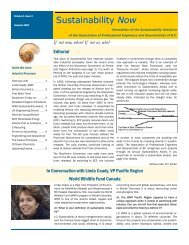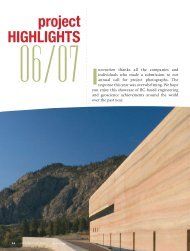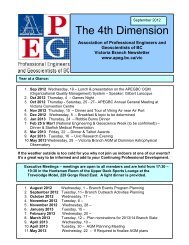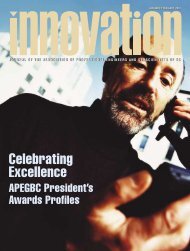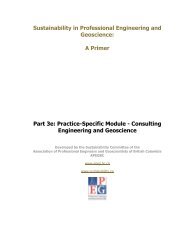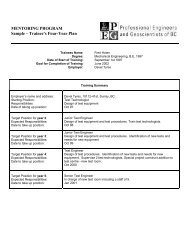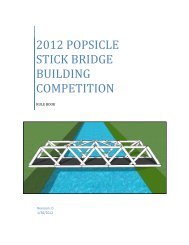3938 APEG Mar.Apr Edit.indd - APEGBC
3938 APEG Mar.Apr Edit.indd - APEGBC
3938 APEG Mar.Apr Edit.indd - APEGBC
Create successful ePaper yourself
Turn your PDF publications into a flip-book with our unique Google optimized e-Paper software.
f eatures<br />
Local Source of Waste Hydrogen Sows the<br />
Seeds of the Hydrogen Economy in BC<br />
26 MARCH/APRIL 2008 INNOVATION<br />
The development of technology to capture and<br />
purify by-product waste hydrogen in North<br />
Vancouver put in place a key building block<br />
for what is known as the Integrated Waste Hydrogen<br />
Utilization Project (IWHUP). IWHUP is a BC<br />
Hydrogen Highway TM project that has brought together<br />
numerous hydrogen industry players and government<br />
organizations to demonstrate a practical and costeff<br />
ective way of enabling hydrogen infrastructure and<br />
hydrogen applications at the same time. Th is project<br />
has kept British Columbia at the forefront of the race to<br />
develop hydrogen energy systems that will contribute to<br />
a sustainable future.<br />
Background<br />
Six years ago, engineering firm Sacré Davey became<br />
aware that two adjacent electro-chemical plants in<br />
North Vancouver were venting by-product waste<br />
hydrogen into the atmosphere. The firm embarked on<br />
developing a cost-effective method of capturing and<br />
purifying these streams to fuel cell grade hydrogen for<br />
use in hydrogen applications.<br />
Hamid Tamehi PEng<br />
Colin Armstrong PEng<br />
The result of this was the development of a<br />
demonstration project that would utilize waste<br />
hydrogen in mobile and stationary applications and<br />
reduce greenhouse gas emissions. It would also have<br />
as its objectives the creation of a platform for other<br />
participating companies to develop and demonstrate<br />
their hydrogen technologies, the development of local<br />
expertise and jobs in the hydrogen energy sector, and<br />
further the development of codes and standards as well<br />
as permitting processes for hydrogen systems. Finally,<br />
the project would provide public education on the<br />
benefi ts and safety of hydrogen.<br />
A consortium of partners was brought together for this<br />
project, and funding was secured from industry partners<br />
as well as Industry Canada, Sustainable Development<br />
Technology Canada, Natural Resources Canada and the<br />
US Department of Defense Climate Change Fuel Cell<br />
Program. Th is fi ve-year, $18 million project entered<br />
its demonstration phase in late 2007 and comprises a<br />
suite of seven sub-projects: a waste hydrogen supply,<br />
compressed hydrogen distribution, light-duty hydrogen<br />
vehicles, a light-duty fuelling station, heavy-duty<br />
This hydrogen<br />
processing facility<br />
supplies purified<br />
hydrogen for the<br />
IWHUP project.


